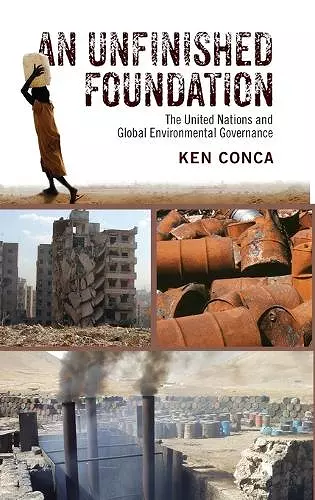An Unfinished Foundation
The United Nations and Global Environmental Governance
Format:Hardback
Publisher:Oxford University Press Inc
Published:27th Aug '15
Currently unavailable, and unfortunately no date known when it will be back
This hardback is available in another edition too:
- Paperback£36.49(9780190232863)

Why is the United Nations not more effective on global environmental challenges? The UN Charter mandates the global organization to seek four noble aspirations: international peace and security, rule of law among nations, human rights for all people, and social progress through development. On environmental issues, however, the UN has understood its charge much more narrowly: it works for "better law between nations" and "better development within them." This approach treats peace and human rights as unrelated to the world's environmental problems, despite a large body of evidence to the contrary. In this path-breaking book, a leading scholar of global environmental governance critiques the UN's failure to use its mandates on human rights and peace as tools in its environmental work. The book traces the institutionalization and performance of the UN's "law and development" framework and the parallel silence on rights and peace. Despite some important gains, the traditional approach is failing for some of world's most pressing and contentious environmental challenges, and has lost most of the political momentum it once enjoyed. The disastrous "Rio+20" Summit laid this fact bare, as assembled governments failed to find meaningful agreement on any of the most pressing issues. By not treating the environment as a human rights issue, the UN fails to mobilize powerful tools for accountability in the face of pollution and resource degradation. And by ignoring the conflict potential around natural resources and environmental protection efforts, the UN misses opportunities to transform the destructive cycle of violence and vulnerability around resource extraction. The book traces the history of the UN's traditional approach, maps its increasingly apparent limits, and suggests needed reforms. Detailed case histories for each of the four mandate domains flag several promising initiatives, while identifying barriers to transformation. Its core implication: the UN's environmental efforts require not just a managerial reorganization but a conceptual revolution-one that brings to bear the full force of the organization's mandate. Peacebuilding, conflict sensitivity, rights-based frameworks, and accountability mechanisms can be used to enhance the UN's environmental effectiveness and legitimacy.
"A careful reconstruction of how environment has been framed in UN deliberations." --Geopolitics "The work's novelty resides in the unique balance that it manages to strike in calling for change without discrediting the international organization responsible for effecting that very change. A commendable job." --Columbia University Journal of Politics & Society "...an intriguing, innovative analysisof the problematic nature of the UN's currentfocus on development and international legal structures as pillars of its environmental policy, and the need to expand the grounding of that policy to include human rights and conflict resolution considerations. [A] well-reasoned, extesnively documented argument." --American Library Association "Reading An Unfinished Foundation convinced me that Conca has a credible case to make. He writes clearly, accessibly, and engagingly, carefully marshaling argument and evidence. His argument is a measured one--that the reforms he is proposing will improve environmental governance, not that they will fix it. Furthermore, he makes it in a way that addresses the weaknesses as well as the strengths of the UN system." --lH-Diplo "Conca provides an intriguing, innovative analysis of the problematic nature of the UN's current focus on development and international legal structures as pillars of its environmental policy, and the need to expand the grounding of that policy to include human rights and conflict resolution considerations. His well-reasoned, extensively documented argument highlights significant weaknesses of current, more-reactive environmental initiatives to address underlying causes of environmental degradation, bring about meaningful change, and address the environmental needs of all sectors of humanity." --CHOICE "This book is the first to connect the evolution of global environmental governance to the mission of the United Nations in its entirety and to explain the history, interconnections, and significance of the UN's work across its mandate to the global environmental and sustainability agenda. Moreover, the book does so seamlessly, effortlessly, and compellingly." -Maria Ivanova, University of Massachusetts Boston "...reading An Unfinished Foundation convinced me that Conca has a credible case to make. He writes clearly, accessibly, and engagingly, carefully marshaling argument abd evidence." -J. Samuel Barkin, University of Massachusetts Boston "Conca leads us through the journey of how the UN has developed, specifically how the environmental aspect has evolved, and what opportunities exist for promoting better global environmental governance within it."-Hannah Keren Lee, Environment & Urbaniziied' "Conca focuses on the present without ignoring the past; in fact, he argues in favor of the integration of rights-based policies combining envrionemntal sustainability with peacbuilding."-Iris Aikaterini Frangou, Columbia University Journal of Politics & Society' "This book examines the origins, effectiveness, and limitations of the United Nations system's approach to global environmental governance."-Academic Council On The United Nations System
- Winner of Winner of the 2020 Grawemeyer Award for Ideas Improving World Order.
ISBN: 9780190232856
Dimensions: 160mm x 239mm x 25mm
Weight: 669g
332 pages